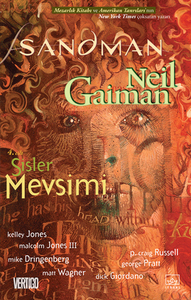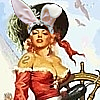Take a photo of a barcode or cover
Could Neil Gaiman maybe stop treating female characters like tools to tell stories?
Redemption for Morpheus, the shaper or dreams. He goes to Hell and back, to free the love he doomed out of pure malice. What an intense journey and serious apology, and still somehow, after it all you see she still holds love for him too. We get to see a very just and vulnerable side of Morpheus, while getting intros to many more of the gods, demons, angels, and strange beings that inhabit this world. We also get to see Lucifer abandon Hell and give away the key to it, letting Morpheus decide what to do with it. I think he made a just decision. What do you think?
challenging
dark
tense
medium-paced
Plot or Character Driven:
A mix
Strong character development:
Complicated
Loveable characters:
No
Diverse cast of characters:
Yes
Flaws of characters a main focus:
Yes
This series is just astounding. This volume was just great!
Anyway, here's what happens:
Morpheus is convinced by his family that he was wrong to condemn Nada to an eternity in hell. He knows that Lucifer is pretty pissed off at him and may not survive a trip to hell, but he goes anyway to free her. However, Lucifer decided that he is done with hell and Dream finds it empty. Lucifer locks the gates and gives Dream the key. A series of factions approach Dream about occupying hell, all dangling something sweet in exchange (i.e., the former demons of hell have Nada). Dream isn't what to do with hell. Eventually, God intervenes and insists that there must be a hell and appoints two of his angels to run it. Dream saves Nada and returns her to the human world as a newborn baby.
Anyway, here's what happens:
Morpheus is convinced by his family that he was wrong to condemn Nada to an eternity in hell. He knows that Lucifer is pretty pissed off at him and may not survive a trip to hell, but he goes anyway to free her. However, Lucifer decided that he is done with hell and Dream finds it empty. Lucifer locks the gates and gives Dream the key. A series of factions approach Dream about occupying hell, all dangling something sweet in exchange (i.e., the former demons of hell have Nada). Dream isn't what to do with hell. Eventually, God intervenes and insists that there must be a hell and appoints two of his angels to run it. Dream saves Nada and returns her to the human world as a newborn baby.
I enjoyed the arc of this story more than the last volume. What to do with the Key to Hell is quite the conundrum, but ultimately the answer is fairly simple. But getting to the answer you get to meet so many interesting and different characters - it hints at what could be done with the Sandman, what it could eventually become, which is interesting to see.
Yet again a female character is thrown into despair for no reason I can fathom (the fairy girl), and a female character is then lifted out of Hell (Nada), but the continual theme he returns to (violence against women as the catalyst of story) is getting old. If I think about it that them is peppered throughout most of his work (Neverwhere, Stardust, the Ocean at the End of the Lane, oodles of Sandman issues) so I am not sure really what to think about it. I hadn't noticed it until this read through and need to noodle on it.
Yet again a female character is thrown into despair for no reason I can fathom (the fairy girl), and a female character is then lifted out of Hell (Nada), but the continual theme he returns to (violence against women as the catalyst of story) is getting old. If I think about it that them is peppered throughout most of his work (Neverwhere, Stardust, the Ocean at the End of the Lane, oodles of Sandman issues) so I am not sure really what to think about it. I hadn't noticed it until this read through and need to noodle on it.
I do love when Gaiman brings different pantheons together and explores how they might interact with one another.




